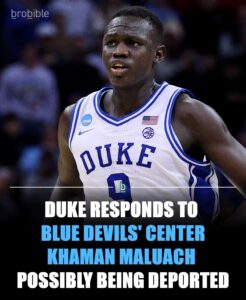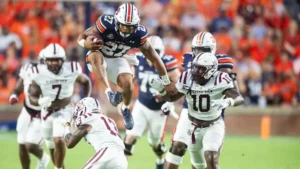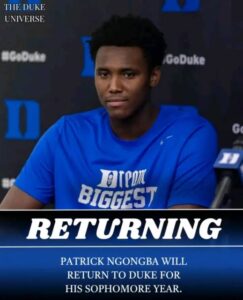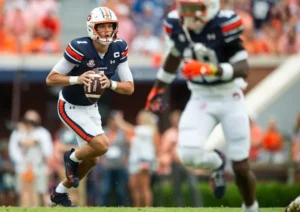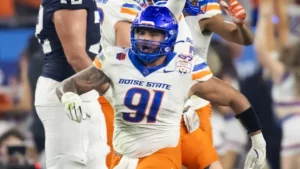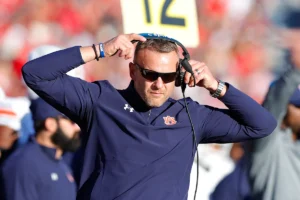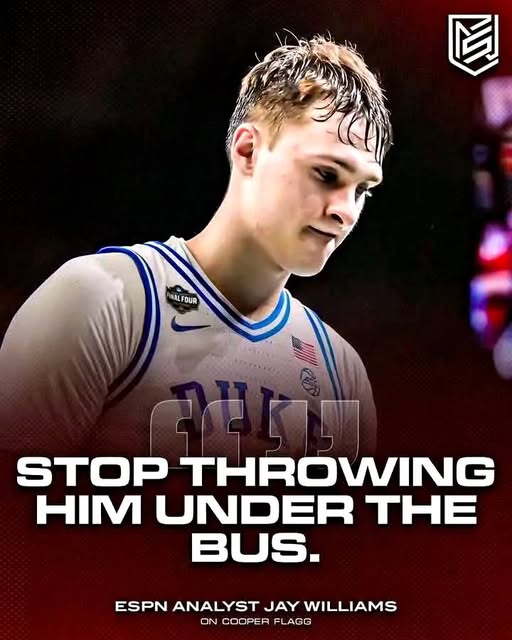
Fans Should Stop Blaming Cooper Flagg Too Much
In the world of modern sports, the spotlight shines brightest on the young prodigies—those teenagers who seem to carry the weight of an entire program, city, or fan base on their shoulders. Cooper Flagg, one of the most talked-about young basketball players in recent memory, is no exception. Since being named the top high school prospect in his class and committing to Duke University, Flagg has been thrust into a whirlwind of attention, expectation, and, unfortunately, blame.
While it’s natural for fans to become passionate about their teams and the players who represent them, it is important to remember that athletes like Flagg are still young, developing, and human. They are not infallible. As such, fans must stop blaming Cooper Flagg too much—especially when criticism becomes disproportionate, personal, or fails to consider the broader context.
This essay explores why Cooper Flagg, and players like him, deserve more patience, empathy, and support from fans. We’ll examine the nature of sports fandom, the unique pressures of being a top recruit, how social media has magnified criticism, and why taking a step back to evaluate our expectations is not only fair but necessary.
1. The Weight of Expectations
Cooper Flagg isn’t just another recruit—he’s been labeled a “generational talent,” compared to NBA stars, and projected as a future No. 1 overall draft pick before even stepping onto a college court. Such labels can be a double-edged sword. While they bring opportunities, they also set nearly impossible standards.
Many fans expect Flagg to dominate every game, lead Duke to a national title, and perform like a seasoned pro. But those expectations ignore a simple reality: Flagg is still a teenager. He’s adapting to a higher level of competition, a demanding academic environment, and an overwhelming spotlight. Expecting him to carry a program single-handedly is both unrealistic and unfair.
Great players often take time to develop. LeBron James was criticized early in his career for not being “clutch.” Kevin Durant struggled with turnovers in his first NBA season. Even Zion Williamson, another Duke phenom, faced intense scrutiny despite outstanding performances. The point is: even legends needed room to grow.
2. Team Sport, Not a One-Man Show
Basketball is a team sport. Success or failure rarely hinges on a single player. Yet when things don’t go well for Duke, some fans are quick to point the finger at Flagg. Did he miss a crucial shot? Did he turn the ball over? Did he fail to dominate defensively?
While every player has off-nights, isolating blame on one individual, especially a freshman, ignores the collective nature of the game. Coaching decisions, team chemistry, bench depth, defensive schemes, and opposing teams’ strategies all play major roles in a game’s outcome.
When fans unfairly single out Flagg, they not only misinterpret the game but create unnecessary pressure that can affect a player’s confidence and development. He’s not a savior—he’s part of a team. And that team’s success depends on cohesion, not heroics.
3. Social Media and the Amplification of Criticism
In the age of social media, criticism spreads faster than ever before. A missed dunk or a bad defensive play can be clipped, meme’d, and shared within minutes. Unfortunately, Cooper Flagg, like many young athletes, is living in an era where every move is under digital surveillance.
What makes this more harmful is that many of the loudest voices online aren’t basketball analysts—they’re fans reacting emotionally, without context. A poor shooting night turns into “Flagg is overrated.” A close loss becomes “Flagg isn’t a leader.” And worse, anonymous trolls can take criticism to deeply personal levels.
This constant barrage can be mentally draining. Athletes today not only face pressure on the court but also in managing their image, brand, and mental health off it. Fans should recognize the human toll this takes. Holding a player accountable is fair—publicly dragging a teenager online is not.
4. Growth Requires Grace
Player development is a process. Even the most gifted talents need time to refine their skills, adapt to higher levels of competition, and mature emotionally. Cooper Flagg’s potential is immense, but he’s still learning, still improving, and still growing.
One of the greatest mistakes fans make is assuming that potential should equal immediate perfection. But development isn’t linear. A bad game doesn’t mean regression. A quiet stat line doesn’t mean a lack of effort. And a freshman season filled with ups and downs is not a failure—it’s a stepping stone.
The best coaches and franchises understand this. They allow young players to make mistakes, to experiment, and to evolve without fear of being labeled a “bust” or “overrated.” Fans should adopt that same mindset. Supporting a player through growing pains often leads to a stronger, more resilient athlete.
5. The Pressure of Representing a Legacy
Duke basketball has one of the most storied legacies in college basketball. From Christian Laettner to Grant Hill to Zion Williamson, the program has produced legends and NBA stars. When Flagg committed to Duke, he immediately became part of that lineage—and with it came immense pressure.
He didn’t just join a team—he inherited expectations that come from decades of success. Every game is national news. Every performance is scrutinized by pundits. And every mistake becomes fuel for critics.
Carrying the hopes of such a passionate fanbase is no small task. And yet, Flagg has handled it with poise. He’s shown maturity in interviews, respect for his teammates, and a willingness to learn. Instead of blaming him for every missed opportunity, fans should applaud his character and patience under fire.
6. The Role of the Media in Shaping Narratives
Sports media often thrives on extremes. A player is either the next Michael Jordan or a complete disappointment. There’s little room for nuance. Unfortunately, this kind of black-and-white thinking influences how fans see players like Flagg.
When a player is hyped endlessly by ESPN, YouTube analysts, and social media influencers, expectations get inflated. Then, when those expectations aren’t immediately met, the same outlets start questioning whether the hype was real. It’s a cycle that can be devastating to young athletes’ reputations.
Fans should be wary of falling into this trap. Media narratives aren’t always rooted in fairness or balance. Instead of echoing hot takes, it’s more productive to evaluate performances with context and compassion.
7. Learning to Be a Fan: Supporting, Not Blaming
Being a fan doesn’t mean blindly supporting everything a player does. It’s okay to critique performance, discuss areas of improvement, or feel disappointed after a loss. But there’s a line between constructive criticism and destructive blame.
Fans who truly care about their team should understand that growth is part of the journey. Supporting a young star like Cooper Flagg means accepting the bumps along the way and recognizing the broader picture.
Cheering a player when they’re winning but turning on them when things go south isn’t loyalty—it’s opportunism. The most impactful fans are those who lift up their team in tough moments, not those who pile on when things get hard.
8. What Cooper Flagg Represents
Beyond the stats, Cooper Flagg represents something powerful: the next chapter of basketball greatness, the spirit of dedication, and the potential of youth. His presence at Duke brings excitement to the game and inspires countless young players watching him chase his dream.
To treat him as just another pawn in the game of wins and losses is to miss the bigger picture. He’s more than a number on a jersey—he’s a person, a teammate, a student, and a young man navigating immense pressure with admirable composure.
Giving him the space to succeed, fail, and grow will not only help his career—it will elevate the culture of fandom in college basketball.
Cooper Flagg is one of the most promising basketball players of his generation. But he’s also a human being navigating extraordinary pressure at a very young age. Fans must recognize this and resist the urge to place blame on his shoulders when things don’t go perfectly.
The future of basketball is bright with players like Flagg leading the way. Let’s not dim that light with impatience, unfair expectations, or harsh blame. Instead, let’s be fans who support, encourage, and believe in the process.
Because when we stop blaming and start believing, we create an environment where athletes can truly thrive—and that’s when the magic happens.
